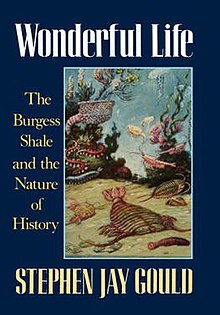Wonderful Life (book)

Cover of the first edition
|
|
| Author | Stephen Jay Gould |
|---|---|
| Country | United States |
| Language | English |
| Subject | Evolutionary history of life, Burgess Shale |
| Publisher | W. W. Norton & Co. |
|
Publication date
|
1989 |
| Media type | Print (Hardcover and Paperback) |
| Pages | 347 pp. |
| ISBN | |
| OCLC | 18983518 |
| 560/.9 19 | |
| LC Class | QE770 .G67 1989 |
| Preceded by | An Urchin in the Storm |
| Followed by | Bully for Brontosaurus |
Wonderful Life: The Burgess Shale and the Nature of History is a 1989 book on the evolution of Cambrian fauna by Harvard paleontologist Stephen Jay Gould. The volume made The New York Times Best Seller list, was the 1991 winner of the Royal Society's Rhone-Poulenc Prize, the American Historical Association's Forkosch Award, and was a 1991 finalist for the Pulitzer Prize.
Gould described his later book Full House (1996) as a companion volume to Wonderful Life.
Gould's thesis in Wonderful Life was that contingency plays a major role in the evolutionary history of life. He based his argument on the extraordinarily well preserved fossils of the Burgess Shale, a rich fossil-bearing deposit dating 505 million years ago. Gould argues that during this period, just after the Cambrian explosion, there was a greater disparity of anatomical body plans (phyla) than exist today. However most of these phyla left no modern descendants. All of the Burgess animals, Gould argues, were exquisitely adapted to their environment, and there exist little evidence that surviving creatures were better adapted than their now extinct contemporaries.
Gould proposed that given a chance to "rewind the tape of life" and let it play again, we might find ourselves living in a world populated by descendants of Hallucigenia rather than Pikaia. Gould's stressed that his argument was not based on randomness but rather contingency; a process by which historical outcomes arise from an unpredictable sequence of antecedent states, where any change in the sequence alters the final result. Because fitness for existing conditions does not guarantee long-term survival — particularly when conditions change catastrophically — the survival of many species depends more on luck than conventional features of anatomical superiority. Gould maintains that, "traits that enhance survival during an extinction do so in ways that are incidental and unrelated to the causes of their evolution in the first place." Gould earlier coined the term exaptation to describe fortuitously beneficial traits, which are adaptive but arise for reasons other than incremental natural selection.
...
Wikipedia
